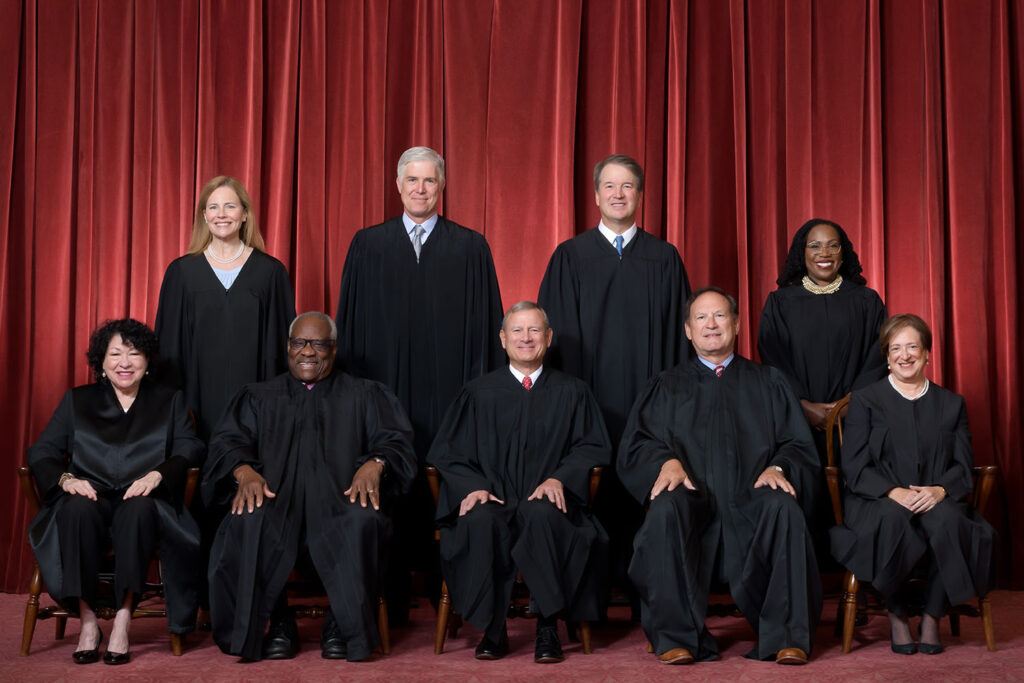
Standing from left are Justices Amy Coney Barrett, Neil M. Gorsuch, Brett M. Kavanaugh, and Ketanji Brown Jackson. (Credit: Fred Schilling, Collection of the Supreme Court of the United States)
Special Report
The U.S. Supreme Court on Tuesday heard arguments in what could be a landmark case about the Biden-Harris administration’s attempt to skirt the authority of Congress by adopting a regulation changing the definition of a firearm in a case known as Garland v. VanDerStok.
While this is not really a pure Second Amendment case, the outcome will have an impact on the rights of gun owners because it will determine whether the federal Bureau of Alcohol, Tobacco, Firearms and Explosives can take what CBS News called “unilateral action” without Congressional approval or authority.
The Second Amendment Foundation joined the case in 2022, along with Defense Distributed.
Published reports suggest the government presented a strong argument, and that the high court justices “appeared skeptical” of the challenge.
The administration contends that so-called “ghost guns” are growing in popularity among criminals who cannot legally purchase firearms from commercial retailers. These “ghost guns” are essentially untraceable.
Government Attorney: Solicitor General Elizabeth Prelogar seemed prepared and stayed on point while arguing the administration’s position. As noted by NPR, the case focuses on how ATF changed the definition of a firearm to address what it considers a growing crime problem: the alleged increasing use of so-called “ghost guns” by criminals.
“Ghost Guns” are firearms assembled by home gunsmiths using kits which are purchased without background checks, and do not bear serial numbers. According to NPR, “On Tuesday a majority of the justices seemed to think the gun-kit sellers were on pretty shaky ground.”
Prelogar contended the ATF’s rule change requires that home-built firearms comply with the same requirements for commercial manufacturers: Guns must have serial numbers which she contended helps investigators solve crimes and keep guns out of the wrong hands.
For the Defense: Arguing for the challengers, attorney Peter A. Patterson with Cooper & Kirk also stayed on point, arguing that ATF exceeded its authority, according to the CBS report. The ATF, he explained, was “operating outside the bounds set by Congress,” which is the focus of the VanDerStok case. As noted earlier, this case is not about whether the “new rule” violates the Second Amendment.
As reported by NPR, Chief Justice John Roberts questioned Patterson’s analogy that building a firearm provides the home gunsmith with the same challenges of working on one’s car. Roberts was quoted by NPR observing that “drilling a hole or two doesn’t give the same sort of reward that you get from working on your car on the weekends.”
The gun kits come with instructions on where to drill holes in the supplied frames in order to complete the project.
Most of the media coverage is suggesting the court may side with the government, even though the Fifth U.S. Circuit Court of Appeals sided with the challengers, nullifying the rule change. Attorney General Merrick Garland appealed to the high court.
What’s Next: The high court is not expected to decide this case until sometime later in the session, and it may not come until the end of the current session, in June 2025. Traditionally, the Supreme Court does not release its most controversial rulings—especially on issues which relate to firearms—until the final days of the session. The Heller ruling in 2008, McDonald decision in 2010 and the Bruen ruling in 2022 all were issued in June.
There are other gun rights cases seeking Supreme Court review.
Delaware: Gray v. Attorney General Delaware and Graham v. Attorney General Delaware are two cases involving SAF in which attorneys have petitioned the court for certiorari. In Gray, SAF is joined by the Firearms Policy Coalition, DJJAMS LLC and two citizens, William Taylor and Gabriel Gray. In the Graham case, SAF and FPC are joined by two other citizens, Christopher Graham and Owen Stevens. They are represented by attorneys Bradley P. Lehman at Gellert, Scali, Busenkell & Brown in Wilmington, Del., and David H. Thompson, Peter A. Patterson and John D. Ohlendorf at Cooper & Kirk in Washington, D.C.
Maryland: In a case which began life as Bianchi v. Frosh and is now known as Snope v. Brown, SAF, the Citizens Committee for the Right to Keep and Bear Arms, Firearms Policy Coalition and others are challenging the state’s ban on so-called “assault weapons.” This is actually the third time around for the case, having initially been vacated and remanded back to the district court in June 2022 for further action under new guidelines established that year by the Bruen ruling. Earlier this year, the case was submitted prior to a decision by the Fourth Circuit Appeals Court upholding the ban. Now challengers are hoping for a “third time is charmed” acceptance.



